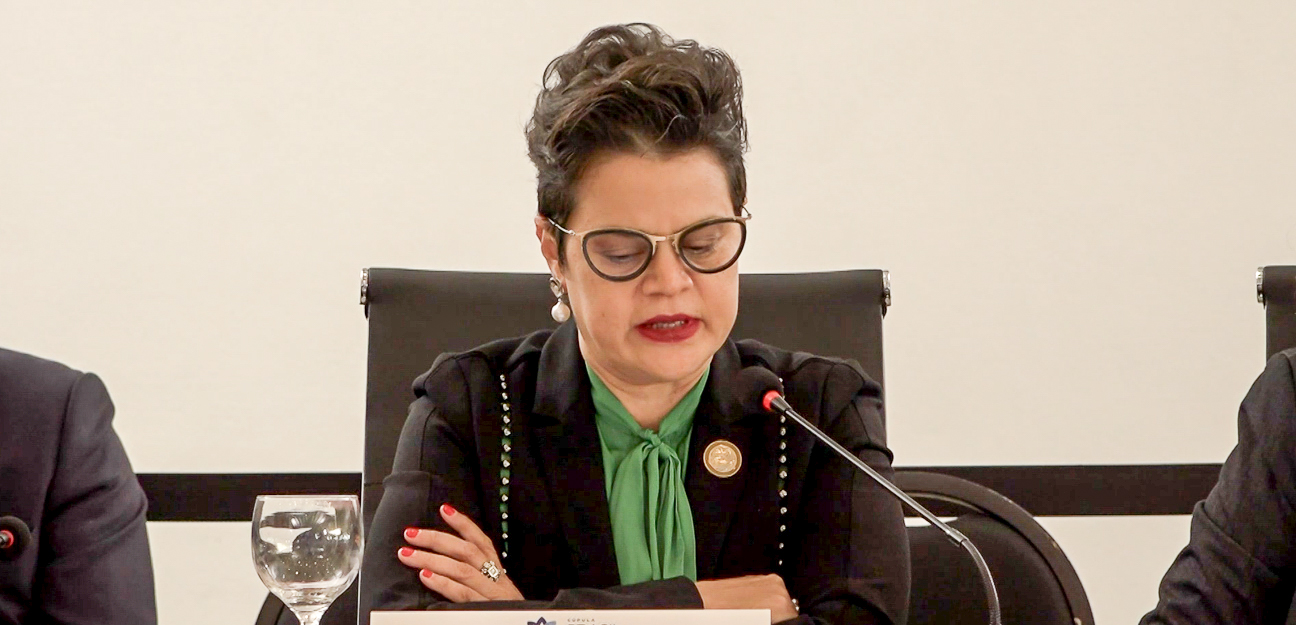Remarks by ACS Secretary-General, Noemí Espinoza Madrid at the Brazil-Caribbean Summit

I greet you with enthusiasm, conviction, and hope that this meeting will be a milestone in our shared history.
Allow me to begin by acknowledging a fundamental fact that unites us: the Association of Caribbean States -ACS was born 30 years ago as a strategic vision driven by CARICOM, with the certainty that it was time to bring Latin America and the Caribbean closer together from sovereign and regional perspectives. We are heirs to the commitment to the political and economic unity of the Greater Caribbean, which is more relevant today than ever.
In a world marked by uncertainty, conflicts, multiple crises, and narratives that fragment and polarize, this alliance represents a profound political affirmation:
In the Greater Caribbean, a region of peace, partnership, and solidarity, it is possible to build collective and just responses.
We celebrate this space as a clear demonstration that the Greater Caribbean is no longer thought of as periphery, but as the epicenter of regional transformation processes, with the aspiration of a future anchored in latinocaribbean integration and the strength of the Global South.
On this path, Brazil is an unique partner. Because it is not only a geographical and economic power; it is also an ethical and political reference for those of us who believe in a multipolar world. Its example allows us to imagine development with a latinocaribbean face, with its own roots.
Excellencies and friends,
We not only have the right to dream of better living conditions, we have the right to live them. To feel that dignity is not a utopia, but an everyday reality.
This right is anchored in our shared history.
As former President José “Pepe” Mujica said:
“We all come from the same roots, from the same history, crisscrossed by pain, hope, and resistance. We have no right to ignore each other.”
And I add: we have no right to ignore the historical debt to the peoples of the Greater Caribbean. A debt that must be settled not only out of responsibility, but also out of ethics and humanity.
I cannot conclude without emphasizing one urgency and one hope.
The urgency: Haiti cannot wait any longer. What is happening there is an open wound in the regional conscience. Respectful and sustained support is required. History will judge us by how we support—or not—the Haitian people.
The hope: The renewed relationship between Brazil and the Greater Caribbean is full of potential to lead a new era of transformative solidarity.
Today, we are weaving the fabric of a new tapestry in Brazil-Caribbean relations, a fabric woven from below, from women's networks, from rural communities, from our youth, and from our Afro-descendant peoples. From all our Caribbean peoples.
We share much more than geography. We are united by a history intertwined with rhythms and resistance, with flavors and words, with bodies that have danced and fought for freedom for centuries.
We are united by the drum, cocoa, corn, carnivals, insurgent poetry, and kitchens that tell memories of survival and creativity.
It is in all of this that profound brotherhood and sisterhood reside, needing no translation. The recognition that we are already united by our roots is the strongest foundation for any cooperation.
This partenreship is a commitment to a multilateralism that transforms and cares for our greatest treasures: our peoples and our Caribbean Sea.
Thank you very much. Muito Obrigada
Discours connexes
Intervention de la Secrétaire générale à la 1ʳᵉ réunion de la Sous-commission des sargasses
Excellences,
Distinguées expertes, distingués experts,
DISCOURS DE S.E. L'AMBASSADRICE NOEMÍ ESPINOZA MADRID, SECRÉTAIRE GÉNÉRALE, À L’OCCASION DE LA RÉCEPTION DE HAUT NIVEAU POUR LE LANCEMENT OFFICIEL DU RAPPORT SUR LA MOBILITÉ CLIMATIQUE DANS LA GRANDE CARAÏBE, LORS DU 3ᵉ SOMMET SUR LA MOBILITÉ CLIMA
Excellences,
Distingués délégués,
Mesdames et Messieurs,
DISCOURS DE NOEMÍ ESPINOZA MADRID, SECRÉTAIRE GÉNÉRALE, À L’OCCASION DU PETIT-DÉJEUNER DE HAUT NIVEAU DES CHAMPIONS DE LA MOBILITÉ CLIMATIQUE DE L’AEC
Excellences,
S.E. Premier ministre Feleti Teo de Tuvalu
S.E. Premier ministre Terrance Drew de Saint-Kitts-et-Nevis




